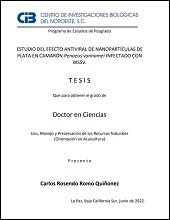Mostrar el registro sencillo del ítem
Estudio del efecto antiviral de nanopartículas de plata en camarón Penaeus vannamei infectado con WSSV
| dc.contributor.advisor | MEJIA RUIZ, CLAUDIO HUMBERTO | |
| dc.contributor.advisor | Álvarez Ruiz, Píndaro | |
| dc.contributor.author | Romo Quiñonez, Carlos Rosendo | |
| dc.date.issued | 2022 | |
| dc.identifier | https://cibnor.repositorioinstitucional.mx/jspui/handle/1001/2656 | |
| dc.identifier.uri | http://dspace.cibnor.mx:8080/handle/123456789/3126 | |
| dc.description.abstract | "Las nanopartículas de plata (AgNPs: por sus siglas en inglés) se han reconocido como una real alternativa para eliminar patógenos de diferentes sistemas biológicos. En el presente estudio evaluamos cinco nuevas formulaciones de AgNPs: Argovit® (Argovit-1®, Argovit-2®, Argovit-3®, Argovit-4® y Argovit-5®), para seleccionar la mejor entre ellas con propiedad antiviral y posteriormente estudiar los efectos tóxicos vía intramuscular y per-os, en camarón (Penaeus vannamei) contra WSSV. Los camarones se sometieron a bioensayos de reto con diferentes objetivos: a) Evaluar toxicidad aguda y efecto antiviral en dosis intramusculares con las cinco formulaciones de Argovit® y seleccionar la mejor; b) Analizar la expresión de genes mediante un estudio de RNAseq en camarones sometidos a Argovit-4® suministradas por vía intramuscular (i.m.); c) Determinar la toxicidad aguda de Argovit-4® suministradas en alimento; d) Evaluar el efecto antiviral de Argovit-4® suministradas en alimento contra WSSV; e) Determinar si Argovit-4® promueve un efecto inmunoestimulante en el camarón cuando se suministra en el alimento; f) Evaluar toxicidad crónica de Argovit-4® suministradas en el alimento con diferentes regímenes de alimentación; g) Determinar la duración del efecto antiviral de Argovit-4® contra WSSV y la respuesta inmune a nivel transcripcional en camarones alimentados con las AgNPs incluidas en el alimento bajo diferentes regímenes de suministro. Los resultados indicaron que las cinco formulaciones evaluadas mostraron propiedades antivirales contra WSSV, siendo, Argovit-4® la formulación con mayor capacidad antiviral sin efectos de toxicidad en camarones. El análisis transcripcional en branquias de camarones expuestos a las AgNPs, no mostró sobre-expresión importante de genes. Paralelamente, el estudio de expresión de genes relacionados al sistema inmune (S.I.) (Pen3, Crustin, PAP, Rab6 y ProPO), no mostró cambios significativos (P<0.05). Asimismo, el efecto antiviral del alimento suplementado con Argovit-4® en camarón, fue dependiente de la concentración de AgNPs, alcanzando supervivencias de 97, 90 y 84% en las concentraciones de 1000, 100 y 10 µg/g de alimento, respectivamente. La aplicación de 1000 µg de Argovit-4®/g de alimento no interfirió con el crecimiento del camarón, ni generó toxicidad y pudo protegerlo contra la infección por WSSV, con mayor eficiencia cuando se aplicó una vez por semana. El análisis de la expresión de los cinco genes relacionados con el S.I..." | es |
| dc.format | es | |
| dc.language.iso | spa | es |
| dc.publisher | Centro de Investigaciones Biológicas del Noroeste, S.C. | es |
| dc.rights | Acceso abierto | es |
| dc.subject | camarón, AgNPs, WSSV, Antiviral | es |
| dc.subject | shrimp, AgNPs, WSSV, Antiviral | es |
| dc.subject.classification | FORMACIÓN DE ANTICUERPOS | es |
| dc.title | Estudio del efecto antiviral de nanopartículas de plata en camarón Penaeus vannamei infectado con WSSV | es |
| dc.type | masterThesis | es |
| dc.dirtesis.grado | Doctorado en Ciencias en el Uso, Manejo y Preservación de los Recursos Naturales | es |
| dc.dirtesis.disciplina | Acuicultura | es |
| dc.dirtesis.universidad | Centro de Investigaciones Biológicas del Noroeste, S.C. | es |
| dc.dirtesis.facultad | Posgrado en Recursos Naturales | es |
| dc.description.abstracten | "Silver nanoparticles (AgNPs) have been recognized as a real alternative to eliminate pathogens from different biological systems. In the present study we evaluated five new formulations of AgNPs: Argovit® (Argovit-1®, Argovit-2®, Argovit-3®, Argovit-4® and Argovit-5®), to select the best among them with antiviral property and subsequently study the toxic effects intramuscularly and per-os, in of shrimp (Penaeus vannamei) against the White Spot Virus (WSSV). Shrimp were subjected to challenge bioassays with different objectives: a) Evaluate acute toxicity and antiviral effect in intramuscular doses with the five formulations of Argovit® and select the best; b) Analyze the expression of genes by RNAseq study in shrimp subjected to selected AgNPs (Argovit-4®) administered intramuscularly (i.m.); c) Determine acute toxicity of Argovit-4® supplied in food; d) Evaluate the antiviral effect of Argovit-4® supplied in food against WSSV; e) Determine if Argovit-4® promotes an immunostimulatory effect in shrimp when supplied in feed f) Evaluate chronic toxicity of Argovit-4® supplied in feed with different feeding regimens; g) To determine the duration of the antiviral effect of Argovit-4® against WSSV and the immune response at transcriptional level in shrimp fed with the AgNPs included in the feed under different supply regimens. The results indicated that the five formulations evaluated showed antiviral properties against WSSV, being Argovit-4® the formulation with the highest antiviral capacity without toxicity effects in shrimp. Transcriptional analysis in shrimp gills exposed to AgNPs did not show significant over-expression of genes. In parallel, the study of gene expression related the immune system (S.I.) (Pen3, Crustin, PAP, Rab6 and ProPO) did not show significant changes (P<0.05). Likewise, the antiviral effect of feed supplemented with Argovit-4® in shrimp was dependent on the concentration of AgNPs, reaching survivals of 97, 90 and 84% at concentrations of 1000, 100 and 10 µg/g of feed, respectively. The application of 1000 µg of Argovit-4®/g of feed did not interfere with growth of shrimp, nor did it generate toxicity and was able to protect it against WSSV infection, with greater efficiency when applied once a week. The expression analysis of five genes related to I.S., did not show significant alterations, which suggests that the AgNPs interact with the virion envelope, disabling it to infect, rather than with the stimulation of S.I. genes..." | es |

